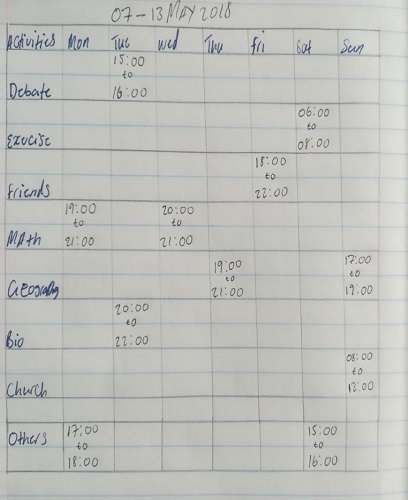Juggling between schoolwork, household chores and/or extracurricular activities is no piece of cake. You may feel like it’s a lot and you can’t cope with so much on your plate. But if Sipho can, why can’t you?
Sipho is a grade 11 Pure Maths and Physics learner. He is a member of a debate club at his school so he has to practice with his team every Tuesday after school. When he gets home his Mom expects him to cook dinner because she works till late in the evening. But Sipho doesn’t sweat it because he has a study timetable. Be like Sipho.
You’ll need:
• Pen/Pencil
• Ruler
• Paper
• Notebook
Your daily tasks
On a notebook make a list of everything that you have to do each day. Your list must include all your classes, household chores and extracurricular activities (if you do any).
Collect class information
Get all your assignments/ projects sheets, exam dates together. This will help you know how much schoolwork you have on hand.
Preferable studying times
What time are you likely to study? At night or in the morning? Some learners like Sipho, prefer to study in the evening when they are done with other tasks.
A format for your timetable
You can either make your study timetable on a piece of paper or on a computer using a spreadsheet. But I would suggest you use a piece of paper that you will put in a plastic-sleeve file rather than a computer. This will help when you want to go through your study timetable in classes where teachers don’t allow students to use digital devices.
However, a study timetable created on a computer spreadsheet is also helpful because you can easily revise your study timetable and make clean changes when needed.
Draw
Use Sipho’s study timetable as a guide. Your timetable doesn’t have to be exactly like Sipho’s.

• Write days of the week in the first row and activities in the first column
• Schedule for 15 minutes breaks when studying. Remember your brain is not a machine.
• Spend more time on the subjects that you find too challenging for you.
• Make a study timetable that changes each week depending on what you have to prioritise on that particular week.
• You can colour your timetable nicely to make it more appealing than Sipho’s.
Note: Study timetable does not help you get more time; it only helps you make the best use of the time you have.
Time is what we want most, but what we use worst. – William Penn.
Tell us: Do you have a study timetable and how do you make sure you stick to it?


